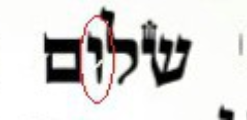I dedicate this essay to two of my BeMidbar students, Ken Richmond (spring 2020) and Sara Blumenthal (spring 2021), who presented on this topic in my class and inspired many of these insights.
The story of Pinchas and the apostasy of Baal Peor straddles two Torah readings: the end of Parashat Balak (Numbers 25:1-9) and the opening of this week’s reading, Parashat Pinchas (25:10-15). The story begins when the Israelites encamped at Shittim and were assailed by a bevy of Moabite women, who lured them into worshipping the god of Baal Peor. Incensed, the God of Israel ordered Moses to “take all the ringleaders and have them publicly impaled before the LORD, so that the LORD’s wrath may turn away from Israel” (Numbers 25:4). But, flouting Moses’ orders, an Israelite man took a Midianite woman, presumably for sexual relations (later identified as Zimri, a chieftain of the tribe of Shimon, and Cozbi, a Midianite princess, vv. 14-15).
Pinchas, the grandson of Aaron, then stepped into the chamber with his spear and skewered the couple en flagrante delicto, thereby averting God’s wrath. Only then do we hear, in retrospect, that a plague had been raging through the camp and that the consequent death toll was 24,000 (v. 9). This is truly the nadir of the Israelites’ sojourn in the desert! Moses fails to punish the leaders and control the mob and Pinchas steps into the breach, operating outside any court sanction, command from Moses, or even orders from On High.
I am intensely uncomfortable with this expression of religious conviction—as were the rabbis two millennia ago; and identify, rather, with the words of the Irish poet, W. B. Yeats: “The best lack all conviction, while the worst/ are full of passionate intensity.”
How could this vigilante act of violence effectively stay the plague? The answer lies in the gap between the two resolutions to the story that straddle the two Torah portions. The first ends last week’s reading (Balak); the plague ceases because of what Pinchas does (v. 9). The second opens this week’s eponymous Torah reading; Pinchas is rewarded with the covenant of peace and he and his descendants inherit the High Priesthood (vv. 11-13). In this resolution to the story, God turns to Moses and says:
Pinchas, son of Eleazar, son of Aaron the priest, has turned back my wrath from the Israelites by manifesting such zeal [be-qan’o ’et qin’ati] among them on my behalf that in my jealousy [qin’ati] I did not consume the Israelites. Therefore say, ‘I hereby grant him my covenant of peace [briti shalom]. It shall be for him and for his descendants after him a covenant of perpetual priesthood [brit kehunat ‘olam], because he was zealous for his God, and made atonement [va-yekhapper] for the Israelites (Numbers 25:11-13, NRSV trans. adapted).
Lest we have any doubts about Pinchas’ zeal [qin’a], these divine words affirm that he acted on behalf of God’s jealousy [qin’a]. As we know from the Decalogue, the Israelites are forbidden to worship any other god, for “I the LORD your God am a jealous God [’El qan’a]” (Exodus 20:5, Deuteronomy 5:9; cf. 4:29, 6:15; 32:16, 19 and 21). Religious zealotry [qin’a] channels the passion of God’s possessive and exclusive relationship with Israel.
To demonstrate that Heaven has his back, so to speak, God affirms Pinchas’ priestly lineage—the son of Elazar, son of Aaron (vv. 11, as in v. 7)—and grants him “my covenant of peace [briti shalom]” (v. 12). How strange to respond to violence with the gift of peace [shalom]! What peace, well-being,or wholeness [shalom] can emerge out of religious violence? Based on the narrative and these words, Pinchas’ act would only be condoned if it turned away the wrath of God when a plague is raging. Consider, similarly, the episode when the Levites turn on the people engaged in worshipping the Golden Calf, killing 3,000 (Exodus 34:26-28). Then, too, God sent a plague in response to Israel’s apostasy (v. 35). After Korah’s rebellion, Moses orders Aaron to run through the camp with his firepan of incense, weaving between the living and dead to stay the plague; 14,700 Israelites died that time (Num. 17:11-14). This is the same power of atonement [kapparah] enacted on behalf of the collective Jewish body on Yom Kippur by the Cohen Gadol (high priest) with incense and prayer. The Cohen single-handedly shifts God from the Throne of Judgment [din] to the Throne of Compassion [raḥamim]. Ibn Ezra understands the briti shalom as equivalent to the “covenant of perpetual priesthood [brit kehunat ‘olam]” (v. 13). Pinchas and his descendants will henceforth carry that mantle of the high priest.
This is, nevertheless, an irresolute peace. According to tradition, the Masoretes (the scribes, responsible for adding vocalization, musical notation and other filigrees to the Torah scroll), mark the Hebrew word shalom—peace, wholeness, well-being—with a severed letter (vav katiyah).
Drawing upon the insights of my students, I would like to give that broken letter a new significance. Throughout the millennia, religious violence has been justified to preserve the integrity of the tradition and the people—cutting, or “skewering” (as Pinchas does with his spear), for the sake of the integrity of the whole. Yet the shockwaves of that violence leave that whole fragile; a broken peace, symbolized by the severed line, a white gap in the letter vav. In the wake of such death, nothing can be a simple connector between Earth and Heaven, Heaven and Earth, again. Only in the End of Days will that peace be whole, as Ezekiel avers: “I will make of covenant of peace/friendship [brit shalom] with them and it shall be an everlasting covenant with them—I will establish them and multiply them, and I will place My Sanctuary among them forever. My Presence shall rest over them; I will be their God and they shall be my people” (Ezekiel 37:26-27). Only in this shalom is the letter vav continuously unbroken; a direct vertical alignment between Earth and Heaven.
We now live in an era without a divine mandate—in the absence of prophecy, of miracles, of any echo from the skies—where the answer is “not in Heaven,” but, according to the Jewish tradition, in rabbinic majority rule (Deuteronomy 30:12, b. Bava Metzia 59b). We do not condone religious violence; no one may lay claim to an unalloyed sense of what is right and wrong.
So, what stays the plague in this day and age? Not a vigilante’s spear or a firepan of incense, but the voice of rationality and science. Schooled in questioning and uncertainty, in laboratories and trials, “truth springs up from the Earth” (Psalm 85:12). And so we try to adhere to the CDC and guidelines for global travel, and, of course, encourage widespread vaccination. This is the only “voice from Heaven” we may hear in this world of fragile peace, the shalom with a severed vav. Yet it too may yield, in the words of Leonard Cohen, “a broken hallelujah.”
Rachel Adelman is associate professor of Hebrew Bible at the Hebrew College Rabbinical School. She received her Ph.D. at Hebrew University in Jerusalem. When she is not writing books, articles or divrei torah, it is poetry that flows from her pen.
This post has been contributed by a third party. The opinions, facts and any media content are presented solely by the author, and JewishBoston assumes no responsibility for them. Want to add your voice to the conversation? Publish your own post here. MORE



